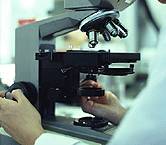 |
 |
 |

More Americans Urged to Get Cancer Screenings
Rates hover around 50 percent, despite proven benefits, report says|
|
HealthDay
Thursday, January 15, 2009
 THURSDAY, Jan. 15 (HealthDay News) -- Screening for breast, cervical and colon cancer saves lives, but too few Americans are getting the recommended screens or getting them regularly enough, a new report shows.
THURSDAY, Jan. 15 (HealthDay News) -- Screening for breast, cervical and colon cancer saves lives, but too few Americans are getting the recommended screens or getting them regularly enough, a new report shows.
The rate of screening for breast and cervical cancers has stayed about the same since 2000, while the rate of colorectal cancer screening has increased but not as fast as experts had hoped, according to the report released Thursday by the American Cancer Society.
"More people need to get screened than are being screened, and they need to get screened regularly -- that's a big problem," said report author Robert Smith, director of cancer screening at the cancer society.
Only 50.6 percent of men and women age 50 to 64, and 57.6 percent of those older than 65, have regular colonoscopies. In addition, only about 19 percent of adults have regular fecal occult blood tests.
Among women, 60.7 percent of those age 40 to 64 have mammograms; that number slips to 59.8 percent for women age 65 and over.
The best way to ensure that you are getting screened according to the American Cancer Society recommendations is to tell your doctor that you want to be current with the guidelines, Smith said. You should also tell your doctor that you want to be reminded when it's time to have a screening test.
For cervical cancer, women should get regular Pap smears, starting at age 20. For breast cancer, women should start getting regular breast examinations at 20 and annual mammograms at 40, Smith said.
For colorectal cancer, both men and women should start regular screening at age 50. Screening for colorectal cancer includes fecal occult blood tests, colonoscopy and computed tomography (CT) colonography, sometimes called virtual colonoscopy.
"We recommend that any stool blood test be done with high-sensitivity fecal occult blood tests or immunochemical tests," Smith said. "We also added CT colonography every five years to the list of acceptable options, as well as stool DNA testing."
The cancer society does not recommend screening for other cancers, such as prostate or lung cancer, Smith noted. "We believe that men should hear about the pros and cons of testing for early prostate cancer," he said.
Smith noted two trials are underway that could determine whether screening for prostate cancer is beneficial. Results of these trials are not expected for several years, he added.
There are also ongoing trials to see if long-term smokers could benefit from lung cancer screening with spiral CT scans, Smith said.
Screening for other cancers, such as ovarian, bladder or pancreatic cancer, has not been proven effective. "We don't have effective screening tests for those cancers, and we don't know whether early diagnosis truly is beneficial, and we don't know if there is a favorable balance of benefits to harms," Smith said.
Smith also thinks that getting a full body scan to look for cancer is a bad idea. "A full body may not be the most effective way of using the technology to find cancer, and it can potentially find things that are not cancer but can't be determined not to be cancer," he said. "That's going to require exploratory surgery or other tests that could run up a high bill."
Smith believes the money would be better spent getting screening that has been shown to be beneficial and effective.
A report from the cancer society published in November in the Journal of the National Cancer Institute found that the number of men and women in the United States getting and dying from cancer had dropped -- the first decline since such statistics were released in 1998.
The drop in cancer rates is attributed mostly to fewer cases of lung, prostate and colorectal cancer among men and fewer cases of breast and colorectal cancer among women. Also, death rates from lung cancer have leveled off among women since 2003.
HealthDay
Copyright (c) 2009 ScoutNews, LLC. All rights reserved.
Related News:
More News on this Date
Related MedlinePlus Pages:
| Home | Health Topics | Drugs & Supplements | Encyclopedia | Dictionary | News | Directories | Other Resources | |
| Disclaimers | Copyright | Privacy | Accessibility | Quality Guidelines U.S. National Library of Medicine, 8600 Rockville Pike, Bethesda, MD 20894 National Institutes of Health | Department of Health & Human Services |
Date last updated: 16 January 2009 |




